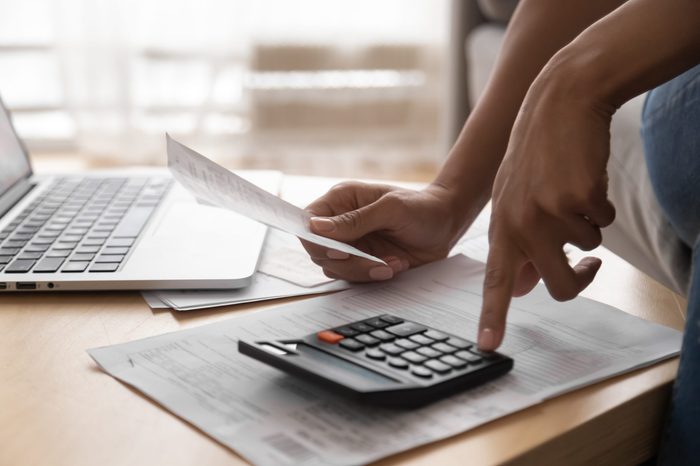
Improve your credit score step 1: Never miss a payment
Payment history factors into a whopping 35 percent of your credit score, so you’ll definitely see the effects if you tend to miss bills. If you didn’t set email reminders when you signed up for your credit card, change your settings now, or mark due dates on your phone or paper calendar. If you still have a hard time remembering, consider setting auto payments, says Gerri Detweiler, head of market education for Nav, a site that helps business owners manage their credit. “Even if you just set up credit cards to automatically have the minimum payment each month is enough to increase credit score,” she says. Just don’t get tricked into thinking it’s out of sight, out of mind. Keep checking your bills for errors, and don’t forget to update accounts if you switch banks. Check out these other 32 secrets accountants won’t tell you.

Improve your credit score step 2: Find your weak spots
Instead of taking your credit score at face value, use the full report to guide you in boosting that number, says Bruce McClary, vice president of communications for the National Foundation for Credit Counseling. “A lot of people focus a lot of their efforts on trying to boost their score and chase a number,” he says. “Don’t just get the score. It will tell you something but not everything.” With a full copy of your report, look for any missed payments or other aspects driving your score down. Then use that information to figure out the clear steps you need to make to get where you want to be. To get your account back in shape, try these 56 almost effortless ways to save money.

Improve your credit score step 3: Check for errors
Once you get your hands on your credit report (it’s free if you ask for your own), comb through it to make sure everything is accurate. Any mistakes could be affecting your credit score negatively. “The worst time to find out is when you’re sitting down applying for a mortgage or trying to get a car loan because at that point it’s potentially too late to do anything to correct it in time to get what you need,” says McClary. “It’s important to be proactive.” Also, keep an eye out for identity theft. Here’s what to do if your wallet is lost or stolen.

Improve your credit score step 4: Ask for a report from all three bureaus
Don’t just settle on getting a single report. Three credit bureaus (Equifax, TransUnion, and Experian) calculate your score separately, and they don’t share information with each other. So just because one report is error-free doesn’t mean you won’t find a mistake on another. If you do need to make a dispute, your best bet is to report it to your credit agency rather than calling individual bureaus. “The advantage of that approach is they should report it to all three credit bureaus if they sent it to all three,” says Detweiler.

Improve your credit score step 5: Figure out a plan to get back on track
As soon as you get a payment or two behind your bills, make a plan to get back up to date as quickly as possible. Talk to a financial expert from a nonprofit credit account agency, or figure out your own strategy, starting with a call to your creditor. “You’d be surprised at how flexible a creditor may be in providing programs to make sure you get back up to date if you’re just behind a few payments,” says McClary. “It’s harder the further behind it is.” Easily improve your credit score with these small steps.

Improve your credit score step 6: Stay well below your credit limit
The closer you come to hitting your limit each month, the bigger of a risk you seem to creditors, which is why your credit score could take a hit when you spend a bigger percentage of what’s available. Experts disagree on exactly how far you should stay below your limit, but Detweiler says that as long as you stick under 20 to 25 percent of your credit line, your score won’t go down. Keep in mind that the balance is calculated when your bill comes out, not after you make your payment. “Even if you’re paying in full each month, the credit score shows your balance,” Detweiler says. Paper money will keep you under the limit—here are more reasons you’re better off paying with cash.

Improve your credit score step 7: Ask for a credit line increase
If you’re constantly closer to your limit than you’d like to be, even though you can afford the higher spending, pick up the phone and ask your credit to increase your credit line. Check your credit report for problem areas before you call so you have a good idea of how they’ll respond. Then be realistic about what you’d like to increase your credit line to, keeping in mind the worst-case scenario if you did over-borrow. “The first thing I’d caution people to consider is they should have a good reason for doing it,” says McClary. “Make sure you’re not taking on a credit limit you may not be able to manage if for some reason you did run the balance all the way up.”

Improve your credit score step 8: Keep your cards open
Tempted to close unused cards? Not so fast. Your credit score doesn’t only take into account the percentage of available credit you use on each card—it also looks at your total credit line. Even if you use a card rarely, it’s still included in the total credit line available to you. “If you’re comfortably at or below 30 percent and all of a sudden you close cards and bring the overall limit down closer to that balance, you’re increasing your credit utilization percentage as it relates to overall credit limit—and that’s a bad thing,” says McClary. If you do need to get rid of a few, close just one at a time and then wait six months or so before closing another, he says. But unless your card has an annual fee or you keep forgetting you used it for small charges, there’s no compelling reason to close it, Detweiler says.

Improve your credit score step 9: Become an authorized user
Family members or trusted friends can help you jumpstart your credit history by naming you as an authorized user to one of their credit cards. If you ask someone responsible who pays their bills on time, their good financial activity will boost your own credit too. You don’t even need a physical copy of the card—you’ll still get the credit score advantages, even if you never use it yourself—but you should still take steps to prove to your loved one that you’ll be dependable. “If you haven’t been responsible, they’re going out on a limb to help you,” says Detweiler. “You have to be trustworthy because if you charge anything on it, they would be responsible.” You might cringe at these other things credit card companies know about you.

Improve your credit score step 10: Don’t apply for a lot of credit at once
While requesting your own credit report won’t affect anything, your score could take a small hit if a third party checks your history when considering you for credit approval. “If you apply at six, seven, eight places, that adds up,” says McClary. “The combined impact of those credit inquiries could have a noticeable effect in the short term.” To avoid a hard blow, don’t apply to too many places at a time. Find out when you should (and shouldn’t) open a store credit card.

Improve your credit score step 11: Get a credit builder loan
You should never take on debt just to improve your credit, but a credit builder loan is a good option for someone looking to, say, start a mortgage in a few years, says Detweiler. Like a cross between a savings account and a loan, you set a loan amount in a certificate of deposit, then make payments each month until you pay it off—and your credit score will go up as you prove yourself reliable. “When you pay it off you have the money in the CD,” says Detweiler. “It’s a savings account, plus a credit reference.”